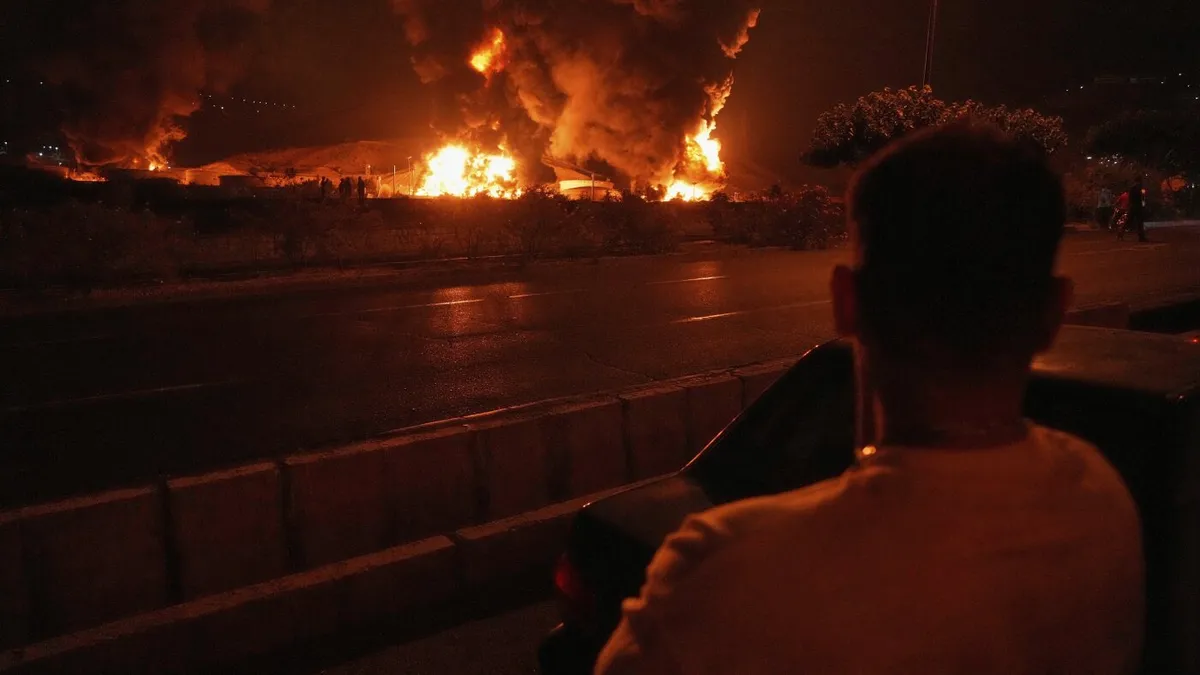
In a dramatic escalation of hostilities, Israel and Iran engaged in a fierce exchange of missile strikes over the weekend, raising alarms about a potential wider regional conflict. This latest wave of violence erupted shortly after planned U.S. discussions regarding Iran's nuclear program were unexpectedly canceled. Israeli missiles targeted two energy facilities located in southern Iran, as reported by Iranian state media.
In retaliation, Iran launched hundreds of ballistic missiles and drones towards Israel, resulting in multiple casualties and significant damage to critical infrastructure, including an oil refinery and a prominent scientific institute. On social media, former President Trump distanced the U.S. from the attacks on Iran, asserting that any Iranian aggression against the U.S. would provoke a devastating military response unlike anything previously seen.
The recent strikes marked one of the most devastating nights for Israelis since the onset of the conflict, with Israeli emergency services, specifically Magen David Adom, reporting at least ten fatalities, including children, and hundreds injured. The wave of Iranian missiles began raining down on Saturday night, with some evading Israel's advanced defense systems. The deadliest attack struck a residential building in Bat Yam, a suburb located south of Tel Aviv, resulting in the deaths of at least six individuals, including a 10-year-old boy and a 9-year-old girl. Local authorities reported that another 180 people sustained injuries, with several still unaccounted for.
In northern Israel, sirens echoed as missiles targeted the nation’s largest oil refinery near Haifa, leading to the deaths of four women in Tamra, an Arab town with a population of around 35,000. Iran's Revolutionary Guard Corps (IRGC) claimed responsibility for targeting Israel's fuel infrastructure in direct retaliation for Israeli strikes on its oil facilities.
In the central city of Rehovot, at least 42 individuals were injured, and several buildings at The Weizmann Institute of Science, a leading research facility, were damaged; however, the center confirmed that no one on campus was harmed despite the severe destruction. The casualties reported on Sunday raised Israel’s death toll to 13 since the commencement of strikes on Friday.
In a surprising twist, Yemen's Houthi rebels announced their support for Iran by launching additional ballistic missiles at Israel. Reports of explosions were also recorded across Tehran early Sunday, with visuals capturing smoke and flames engulfing an oil facility in the city. Israeli Defense Minister Israel Katz tweeted about the devastation, stating that Israel's military forces attacked 80 targets overnight, including Iran's nuclear installations and fuel sites. The casualty count in Iran from the recent bombardments remains unclear, but Iran's UN ambassador reported that 78 individuals had been killed and over 320 injured since the conflict reignited.
Among the deceased are nine senior nuclear scientists and four high-ranking Iranian generals. Despite the government’s official stance, some Iranians expressed private satisfaction over the deaths of their leadership. In a striking statement, a 50-year-old woman from near Tehran, who requested anonymity, expressed her relief, stating that the news made her feel joy and gratitude towards Israeli Prime Minister Benjamin Netanyahu for targeting what she termed ‘criminals.’ Others voiced hope that these developments could signal the potential collapse of Iran’s longstanding regime.
The escalating conflict has prompted urgent calls for diplomatic resolution from global leaders. In a post on Truth Social, Trump urged both nations to swiftly negotiate a peaceful agreement, emphasizing the possibility of a deal to end the bloodshed. Following Israel's initial attack, British Prime Minister Keir Starmer emphasized the necessity of stability in the Middle East and called for restraint and a return to diplomatic discussions.
UN Secretary-General Antonio Guterres also urged both parties to exercise maximum restraint, while Pope Leo XIV called for sincere dialogue amidst the deteriorating situation between Israel and Iran. Israel's initial offensive on Thursday was reportedly based on intelligence from its Mossad spy agency, which indicated that Iran was nearing the capability to develop a nuclear weapon. Israel, believed to possess its own nuclear arsenal, views Iran's nuclear ambitions as an imminent threat to its national security.
This wave of attacks coincided with the U.N. nuclear watchdog's report indicating Iran's non-compliance with nuclear nonproliferation agreements, aimed at curbing the proliferation of nuclear weapons. In response, Iran announced plans to establish a new uranium enrichment facility, insisting that its uranium enrichment efforts are for peaceful purposes.
In a video statement on Friday, Prime Minister Netanyahu disclosed that the operations against Iran had been in preparation since September, following the assassination of Hassan Nasrallah, the leader of Hezbollah, in Beirut. Netanyahu cautioned that a disruption of the regional Iranian axis could prompt Iran to expedite its nuclear program. The attack, initially scheduled for April, was delayed, he noted.
As hostilities escalate, the U.S. and Iran were set to begin the sixth round of negotiations regarding Iran's nuclear program in Oman. However, the Omani foreign minister announced on social media that the meeting was canceled while emphasizing that diplomacy and dialogue remain the only viable paths to lasting peace.